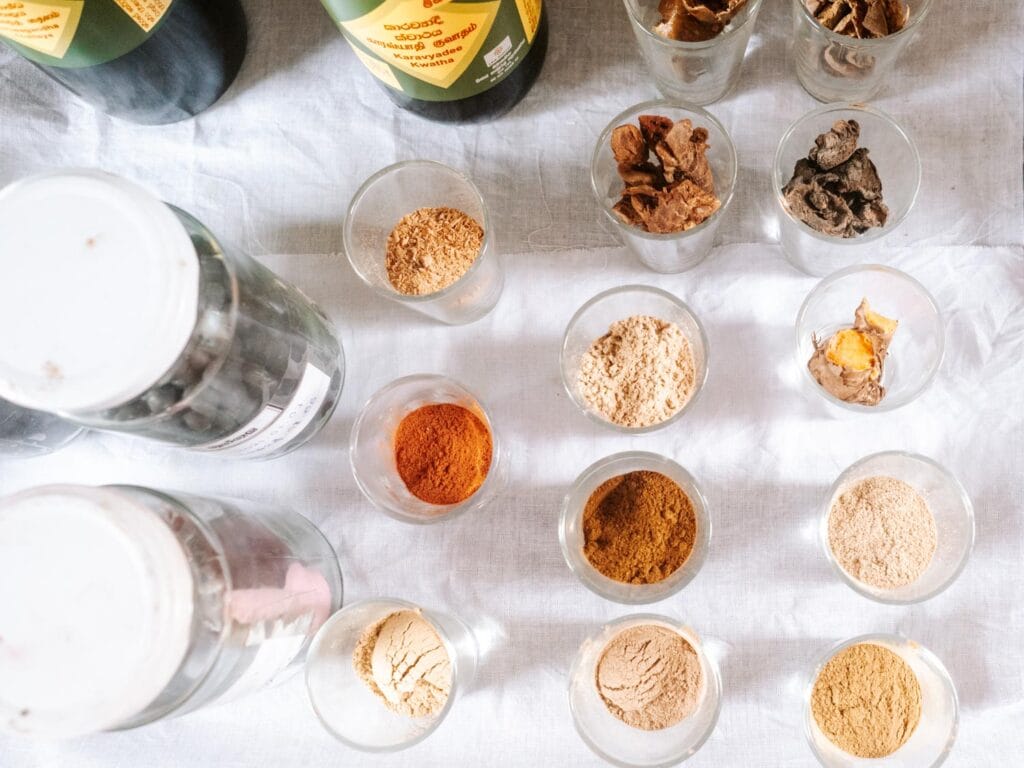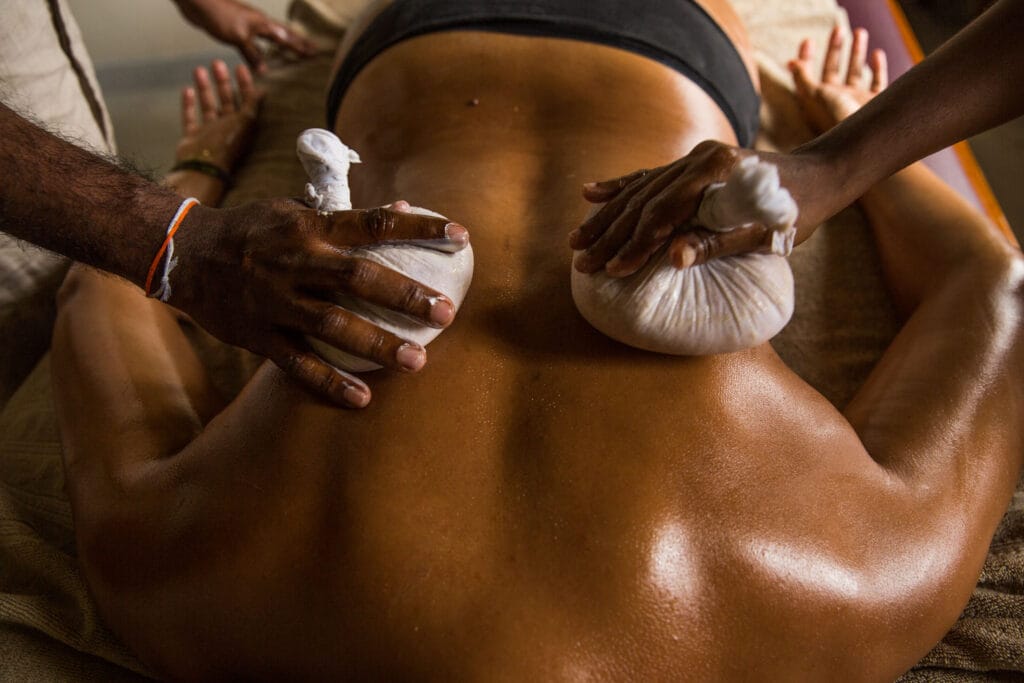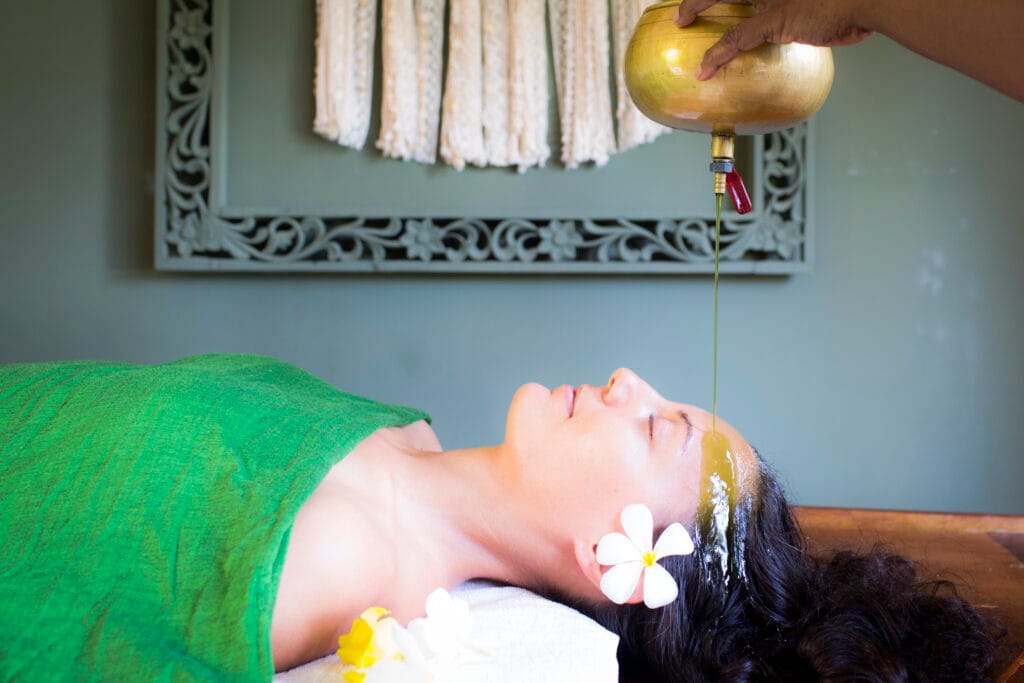What is Panchakarma?
Panchakarma translates to ‘five actions’ in Sanskrit and is an Ayurvedic cleansing and detoxification treatment programme. Traditionally, it comprises five sequential treatments that work synergistically to eliminate toxins and balance the doshas to their natural equilibrium:
- Vasthi (herbalised enema): herbal oils or medicines are suspended through the rectum to cleanse the intestinal tract.
- Nasya (nasal irrigation): medicinal oils are administered through the nostrils to clear the sinuses and drain excess mucus.
- Virechana (purgation therapy): herbal medicines with gentle laxative effects are ingested to induce bowel movements and eliminate toxic and metabolic waste from the liver, gallbladder and intestinal tract.
- Vamana (therapeutic vomiting): herbal medicines are ingested to induce therapeutic vomiting and encourage the release of accumulated toxins and mucus in the upper gastrointestinal and upper respiratory tracts. This treatment is only administered for severe disease conditions.
- Raktamokshana (blood letting therapy): carefully controlled quantities of impure blood are removed to neutralise accumulated toxins. This treatment is only administered for severe disease conditions.
According to Ayurveda, every living or non-living being in nature is a combination of five basic elements: earth, water, fire, air and ether. The human body too is created from these elements in various compositions; therefore, optimal health is not only a state of balance within the body but with the external environment. A combination of ether and air constitutes the vata dosha, a combination of fire and water constitutes the pita dosha, and a combination of water and earth constitutes the kapha dosha.
Each constitution has its own unique ‘fingerprint’ or balance of vata, pita and kapha which determines their unique combinations of physical, mental and emotional characteristics. This doshic balance is the natural order, and any disturbance that causes excess or deficiency of vata, pita or kapha causes disorder.
A key culprit of imbalance is the accumulation of toxins or ‘Ama’ due to often unhealthy eating habits, stress and exposure to toxic chemicals and pollutants which can impede our body’s natural ability to efficiently remove toxins. Ama, however, can also refer to the toxic residue of emotions or experiences that have not been fully metabolised. The build-up and spread of Ama clogs the channels that function for release and leads to the deterioration of bodily function.
Panchakarma therapy offers an intensive treatment programme to release toxins and restore the body’s natural healing and cleansing capacities. It offers an array of benefits to reduce inflammation, reset the autonomic nervous system to induce a state of rest and recovery, and often release deep-rooted stress that has been held in the body for a long time. Developed over 5,000 years ago, it is a treatment method that has stood the test of time.
While the terms ‘panchakarma’ and ‘detox’ are often used interchangeably, it is important to note that while detox encompasses a broad spectrum of cleansing practices and treatments that often include dietary modifications, panchakarma refers to a specific Ayurvedic treatment protocol.

Benefits of Panchakarma
Whether you are in good health or have a specific condition that you wish to address, panchakarma treatment can serve as both a preventative and curative measure, contributing significantly to general well-being. While the treatment suitability and outcome may vary from individual to individual, some reported benefits include:
- Eliminates toxins from the body and mind, which are the root cause of disease
- Restores balance in the Vata, Pita and Kapha doshas
- Strengthens your immune system and supports resilience to disease
- Improves digestion and metabolism, supporting weight loss and promoting better nutrient absorption
- Improves skin health by promoting circulation and removal of impurities
- Encourages deep relaxation and stress reduction
- Increases energy levels, vitality and mental clarity
Why visit Sri Lanka for a Panchakarma Retreat?
Sri Lanka is a highly sought-after destination for those seeking authentic panchakarma treatment.
The wisdom of Ayurveda and traditional indigenous medicine is deeply ingrained in Sri Lankan culture, functioning not just as a well-established medical system, but as a way of life that recognises the interconnectedness of the body, mind, and spirit to maintain our natural state of health and happiness. This knowledge has been preserved and passed down through generations of Sri Lankan practitioners and continues to be shared in wellness centers and hospitals throughout the country. In addition, an abundance of medicinal herbs and plants flourish in Sri Lanka’s varied climate and geography which lies at the core of Ayurvedic therapy.
Importantly, Ayurveda emphasises a holistic approach to health and recognises the healing power of a peaceful and rejuvenating natural environment. Known as the teardrop of India, Sri Lanka exudes a unique charm with miles of unspoiled beaches, lush green rainforests, and vast mountain landscapes. It is an island of warmth, abundance and vibrancy – an ideal setting for a transformative healing journey.

Panchakarma at the Sen Wellness Sanctuary
Although panchakarma is traditionally an intensive and demanding programme, our team at the Sen Wellness Sanctuary have developed a modified version that is suitable for the modern lifestyle, based on decades of experience working with Western constitutions. Our focus is on non-invasive treatments including Vasthi, Nasya and Virechana, which integrate well with other treatment modalities.
This treatment programme is most effective for longer durations of stay, therefore, we recommend a minimum of 7 days and if possible, 10-14 days to fully experience the benefits. Traditionally, it is recommended to undergo a panchakarma programme with each change of seasons or every three months, as it is easy for things to fall out of balance during times of transition.
Upon arrival, you will have a consultation with the resident Ayurvedic doctor who will curate a personalised treatment programme and determine the suitable herbal oils and medicines based on your dosha and potential imbalances. Each day, you will receive two to three treatments (totalling 80 – 90 minutes) that will be administered in three stages.
Stage 1: Preparation (Poorva Karma) (1 - 3 days)
During this stage, the body is prepared for elimination and detoxification. Treatments are aimed at encouraging drainage and toxin release from the internal organ systems and include:
Abhyanga (massage therapy) is the external application of warm medicinal oils to the body, to stimulate lymphatic drainage, increase blood circulation and loosen toxins.
Swedana (herbal sweat treatments) is a form of therapy that uses herbal steam to open up the pores and release impurities through the skin. This treatment is often given after Snehana.
Stage 2: Cleansing procedure (Pradhana Karma) (3 - 7 days)
Following the preparatory stages, the cleansing procedure focuses on a selection of the five classical panchakarma treatments; this will depend on the dosha imbalance and individual suitability as determined during the doctor’s consultation.
At the Sanctuary, the initial stage typically focuses on Virechana where herbal medicines with gentle laxative effects are ingested to induce bowel movements and eliminate toxic and metabolic waste from the liver, gallbladder and intestinal tract.
If suitable for the guest’s constitution and needs, additional panchakarma treatments may be prescribed, including:
Nasya (nasal irrigation): medicinal oils are administered through the nostrils to clear the sinuses and drain excess mucus. This is a particularly effective treatment for sinus problems, migraines, chronic colds, and allergies.
Vasthi (herbalised enema): herbal oils or medicines are suspended through the rectum to cleanse the intestinal tract. This therapy primarily treats the vata dosha, which is the main causal factor in the manifestation of disease. It is effective in treating digestive disorders and nervous system disorders.
In between each of the principal panchakarma treatments, there will be rest days with gentle treatments, alongside yoga and meditation classes to promote the body’s natural healing abilities.
Stage 3: Integration (Paschat Karma) (2 - 4 days)
The final stage of panchakarma focuses on rehabilitation and rest, with treatments to induce deep relaxation of the body and mind, such as:
Abhyanga which is the oil massage therapy as introduced earlier.
Shirodhara is a procedure where warm oil is poured over the forehead in a gentle steam which is then massaged into the head, face and neck. This treatment functions to pacify the central nervous system and has a profoundly stress-relieving effect.
At the heart of Ayurveda is a holistic approach to health. The panchakarma programme is supported by a light, clean diet combined with teas, fresh juices and herbal medicines to support complete detoxification on the physical level and allow the body to concentrate its efforts on healing. This will work alongside daily yoga, meditation, breathwork and other spiritual practices to support an emotional and spiritual cleanse.
Before departure, guests will have a final consultation with the Ayurvedic Doctor who will prescribe specific dietary and lifestyle regimes to maintain the digestive fire and prevent toxin accumulation.

The Final Word
Our panchakarma programme goes beyond a traditional medical experience and includes Ayurvedic treatments, herbal medicines, yoga, meditation and nourishing food to support complete detoxification on a physical, emotional and spiritual level. We provide an environment for individuals to immerse in the healing of nature and a supportive space for individuals seeking to begin their healing journey.
